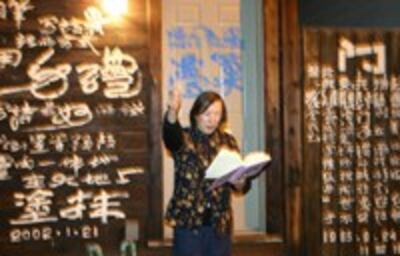
PITTSBURGH--A dissident Chinese poet who has spent more than 10 years in prison for refusing to submit to the Communist Party propaganda machine has found a home for himself, his wife, and his poems in the U.S. state of Pennsylvania.
Huang Xiang, who began writing in 1958 during Chairman Mao's anti-rightist political campaigns, still can't get his poems published in China. But Huang has finally found a public space big enough for his work--he's painted his poems all over his house.
Poet in exile
"For 40 years or more, I haven't been able to get my work published in my own country," Huang, 63, told RFA's Mandarin service. "But there's a tremendous power that comes from psychological victory, and there's nothing they can do to block that out."
"I left China because there was nothing else left for me to do," Huang said. "I don't know why it is that on that piece of land, under that particular sky, those people have not been able to read my collection of poems, haven't been able to publish it."
I am still inexpressibly moved by this experience; by the communicability of the human spirit.
Huang has been called 'China's Walt Whitman.' His poetry, like Whitman's, spans a wide range of topics from nature and love to politics. He was welcomed to Pittsburgh in an official declaration by the city's mayor, Tom Murphy.
City declares Huang Xiang Day
"Huang Xiang is ready to sacrifice his personal freedom and his life to speak the truth in the face of tyranny and he is a poet of unrivalled power in the China of his time," Murphy's statement said, adding that Huang and his wife Zhang Ling were offered refuge in the city under the North American Cities of Asylum program.
"I, Tom Murphy, Mayor of the City of Pittsburgh, welcome Huang Xiang and Zhang Ling to our beautiful city and extend my best wishes for health, happiness, and peace, and I do hereby declare Sunday, Nov. 21, 2004, to be 'Huang Xiang Day' in the City of Pittsburgh," the declaration said.
As part of the ceremony, Huang painted a poem on the walls of his wooden house and recited it from his doorstep for city dignitaries and arts connoisseurs.
We are filled with a profound relief to have our house of poetry to live in.
"Coming to Pittsburgh has presented me with such good fortune--this is a feeling I've never had in my life until now," Huang told RFA.
Nest of dreams
"I am still inexpressibly moved by this experience. By the communicability of the human spirit, by the fact that my poems, my calligraphy on the house, my recitals, and my body language have found resonance with so many people in the United States."
His wife, Zhang Ling, said the couple felt privileged to have found the house, a wood-framed building more than 100 years old. She explained the inscriptions on the door, which read "House of a Poet" and "Nest of Dreams."
"Now that we have come to this part of the world, we are filled with a profound relief to have our house of poetry to live in," Zhang said. "We hope to turn it into a true nest of dreams, something that has eluded us for a long time. We hope it will put down roots in this land."
Born in 1941 in the central Chinese province of Hunan, Huang started writing poetry at age 17, in 1958. He became a rising star in the Chinese Writer's Association but was subjected to political persecution in 1959.
Jailed six times for refusing to toe the Party line in his writings, he has spent more than 10 years behind bars in all.
Huang Xiang is ready to sacrifice his personal freedom and his life to speak the truth in the face of tyranny.
But Huang hasn't stopped writing. His work includes poems, ballads, meditations in poetry and prose on philosophy and other subjects, a short story, commentaries, and memoirs, making a total of 16 volumes of published work overseas.
Huang arrived in the United States in 1997, publishing a collection of his poems soon afterward.
The Day is Fading
A 16-line poem by Huang Xiang There's a kind of space A new order of vastness There's another sort of sky A newly arching vault The close-packed cells of my body harbor distances not to be arrived at Unreachable stardust lies occulted in my flesh and blood Death the unrefusable is born from a gentle, unhurried fall And unavoidable existence looks forward as passion fades In the dusty world under brilliant stars I move day by day into old age And in that space that is outside space the flower of my youth unfolds alone. Unofficial translation for information only. Read the Chinese original here
